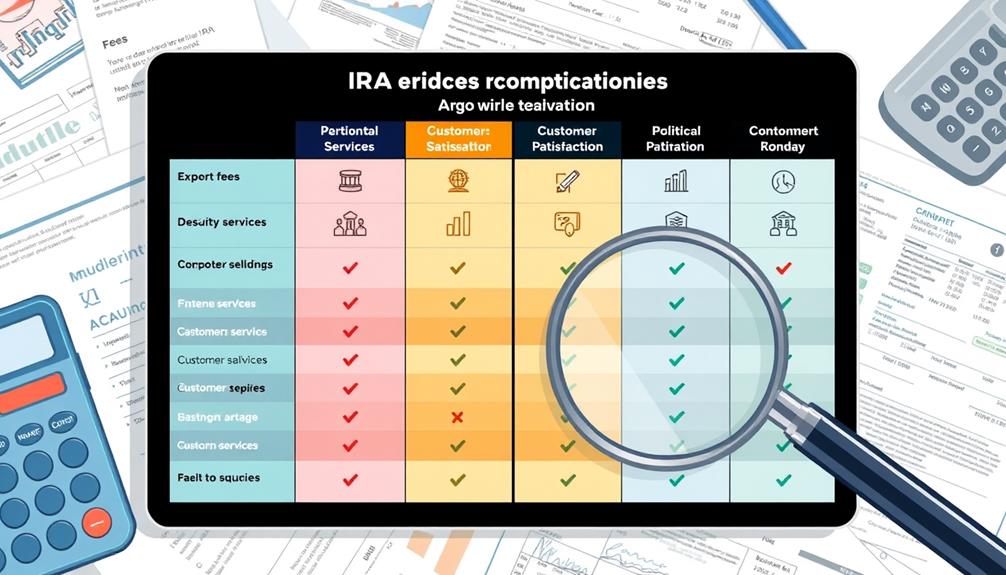In Colorado, withdrawals from an IRA are subject to taxation as regular income at a flat rate of 4.4%. Individuals aged 55 and over have the option to claim a retirement income deduction of up to $20,000, potentially lowering their overall tax obligation. For those 65 and older, there is also the opportunity to deduct up to $24,000 from Social Security benefits. It is important to note that there may be local taxes applicable based on your place of residence. Evaluating the tax implications at both the state and local levels is crucial for maximizing your retirement plan. For more in-depth information and advice on effectively managing your IRA withdrawals, continue exploring.
Key Takeaways
- Colorado applies a flat income tax rate of 4.4% on all taxable income, including IRA withdrawals.
- Individuals aged 55 and older can deduct up to $20,000 from taxable IRA distributions.
- Seniors aged 65 and older can deduct up to $24,000 from taxable income, including Social Security benefits.
- Local taxes may apply, impacting the total tax liability on IRA withdrawals and varying by jurisdiction.
- Utilizing tax planning resources can help optimize strategies for managing retirement account distributions in Colorado.
Colorado Income Tax Overview

When it comes to Colorado's income tax, you'll find a straightforward system with a flat rate of 4.4% applied to all taxable income, including your IRA withdrawals. This means that when you take money out of your traditional IRA, it'll be taxed at the same rate as your other income.
Colorado residents are taxed on their modified federal taxable income, which includes those withdrawals.
One major advantage for individuals aged 55 and older is the retirement income deduction of up to $20,000. This deduction can greatly reduce your taxable income from IRA withdrawals.
Additionally, if you're 65 or older, you can deduct up to $24,000 from your taxable income for Social Security benefits, providing further tax relief.
Importantly, Colorado doesn't impose an estate tax or inheritance tax, making it a favorable environment for retirement planning. This means that your heirs won't face additional taxes on inherited assets, allowing you to pass on your wealth without the burden of extra taxation.
Taxation of Retirement Accounts

Understanding the taxation of retirement accounts is essential for effective retirement planning in Colorado. When you withdraw from your IRA, those distributions are considered taxable income, subject to Colorado income tax at a flat rate of 4.4%. This applies to all retirement accounts, including 401(k)s and pensions.
It's vital to factor in this rate when planning your retirement income, as it can impact your overall tax liability.
If you're 55 or older, you can take advantage of a retirement income deduction of up to $20,000 on your IRA distributions, which can help reduce your taxable income.
Additionally, while Social Security benefits are partially taxable, individuals aged 65 and over can fully deduct these benefits from their taxable income, which can further optimize your financial situation.
Deductions for Seniors and Veterans

As you navigate retirement in Colorado, it's crucial to be aware of the deductions available for seniors and veterans that can greatly lower your tax burden. Colorado offers considerable tax relief for retirees aged 65 and older. You can deduct up to $24,000 from your taxable income, including withdrawals from retirement accounts, which reduces your overall state taxes.
The Senior Property Tax Exemption provides a 50% exemption on the first $200,000 of your home's value, helping ease the financial strain of property taxes.
If your retirement income is limited, you may qualify for the Property Tax/Rent/Utility rebate (PTC Rebate), which can provide up to $1,112 for low-income seniors.
For veterans, certain military retirement pay may qualify for specific exemptions, further helping you manage your tax obligations.
Additionally, Colorado allows deductions on Social Security income, making it a more favorable environment for retirees compared to many other states.
Understanding these deductions for seniors can greatly impact your financial planning in retirement, ensuring you maximize your benefits while keeping your Colorado taxes in check.
Local Tax Considerations

Maneuvering local tax considerations is just as important as knowing the deductions for seniors and veterans. In Colorado, local income taxes can vary considerably, impacting your overall tax liability on IRA withdrawals.
For example, if you live in Denver, you'll face an additional occupational privilege tax of $5.75 per month if you earn over $500, which can affect your net income from IRA distributions.
While Colorado has a flat state income tax rate of 4.4% on IRA withdrawals, local jurisdictions may impose additional taxes, further increasing your total tax burden. It's essential to understand local tax rates, as specific municipalities may have unique taxes that influence your finances.
Additionally, consider the average combined state and local sales tax rate of 7.81%, which can diminish your purchasing power when you take money out for everyday expenses.
Resources for Tax Planning

When it comes to tax planning for IRA withdrawals, utilizing available resources can make a notable difference in your financial strategy.
Understanding Colorado tax implications is essential, especially since the state imposes a flat income tax rate of 4.4% on IRA withdrawals. If you're 65 or older, remember you can deduct up to $24,000 of retirement income from your taxable income, which can greatly reduce your tax burden.
To navigate these complexities, consider taking advantage of free tax assistance programs like the IRS Volunteer Income Tax Assistance (VITA) and AARP Tax-Aide; they can help you understand how IRA withdrawals impact your adjusted gross income (AGI) and tax return.
Additionally, resources like SmartAsset can connect you with financial advisors who specialize in tax planning around retirement account distributions.
Don't forget to factor in local taxes, such as Denver's occupational privilege tax, when planning your withdrawals.
Frequently Asked Questions
Does Colorado Tax IRA Withdrawals?
Yes, Colorado does tax IRA withdrawals. The state income tax rate of 4.4% applies to your withdrawals, so you'll need to factor this into your overall tax liabilities when planning your retirement income.
Do You Pay State Income Tax on IRA Withdrawals?
You might be wondering if you'll owe state income tax on those IRA withdrawals. Well, yes, you do pay state income tax on IRA distributions, but there are deductions that could lessen your tax burden.
What Is the Senior Income Tax Exemption in Colorado?
In Colorado, seniors aged 65 and older can claim an income tax exemption of up to $24,000 on retirement income. This deduction helps reduce your taxable income, offering financial relief during retirement.
Does Colorado Tax Inherited Ira?
You might think inherited IRAs aren't taxed, but in Colorado, they are subject to a flat income tax rate of 4.4%. Understanding these implications helps you plan your withdrawals effectively and minimize unexpected tax burdens.
Conclusion
Maneuvering the tax implications of IRA withdrawals in Colorado can feel like driving through a winding mountain pass—challenging but rewarding when you reach your destination. Just like you'd prepare for a road trip by mapping the best route, understanding the state's tax rules can help you make the most of your retirement savings. So, take the time to plan ahead, and you'll find the journey smoother and your financial future brighter.









